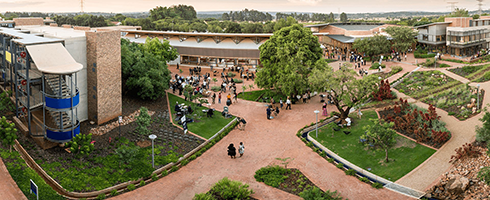You are here: Home1 / Challenge Domains2 / Sustainable Food Systems3 / Unpacking STEM Careers: Her Voice in Science
Unpacking STEM Careers: Her Voice in Science
Celebrating the 2025 International Day of Women and Girls in Science in Sustainable Food Systems Research
On February 11, 2025, the world marked the 10th anniversary of the International Day of Women and Girls in Science under the theme “Unpacking STEM Careers: Her Voice in Science.” This year’s theme highlights the importance of amplifying women’s voices in science, technology, engineering, and mathematics (STEM), fostering equal opportunities, and breaking down barriers that limit their participation in these fields.
Why This Day Matters
Despite progress in gender equality, women remain underrepresented in STEM fields globally. Only 33.3% of researchers worldwide are women, and in many countries, gender-based barriers still limit access to STEM education and career advancement. As the world faces pressing global challenges—climate change, food insecurity, and sustainable development—it is critical to harness the full potential of all scientists, including women, to drive innovation and solutions.
This year’s theme resonates deeply with the work being done under the Future Africa Sustainable Food Systems Challenge Domain—a collaborative research initiative that is shaping sustainable food systems in Africa while fostering the next generation of African women scientists.
Women in Science at the Heart of Sustainable Food Systems Research
The Future Africa Research Chair in Sustainable Food Systems (FA-SFS) is leading transformative research to improve food security and sustainability in Africa. This initiative, hosted at the University of Pretoria’s Future Africa, brings together researchers from diverse disciplines to tackle food system challenges through integrative and transdisciplinary approaches.
Several pioneering projects and initiatives under FA-SFS are making strides in sustainable food systems while actively supporting women scientists:
ARUA-SFS: Building Networks of Excellence
The African Research Universities Alliance Centre of Excellence in Sustainable Food Systems (ARUA-SFS) connects top researchers from African universities to collaborate on food systems transformation. Women researchers play a key role in ARUA-SFS, contributing to solutions that align with the Sustainable Development Goals (SDGs) and Agenda 2063: The Africa We Want.
By fostering partnerships between African and global institutions, ARUA-SFS is empowering women in science through mentorship programs, collaborative research, and leadership opportunities in food systems research.
CoRE-SFS: Strengthening Global Research Collaboration
The Africa-Europe Cluster of Research Excellence in Sustainable Food Systems (CoRE-SFS) is a transcontinental research platform that integrates expertise from 22 partners across Africa and Europe. CoRE-SFS is strengthening research capacity and institutional collaboration, ensuring that African women scientists are positioned at the forefront of food systems transformation.
This initiative is also helping to address gender disparities in STEM by creating an inclusive research culture, offering scholarships for female scientists, and supporting interdisciplinary projects that amplify women’s contributions to science.
UKUDLA: Advancing Data-Driven Food Systems Research
Launched in January 2025, UKUDLA (Nguni for “food”) is an African-German Centre of Excellence dedicated to sustainable and resilient food systems, which is a collaborative effort involving leading institutions, including the University of Pretoria (UP), the University of the Western Cape, and the University of Mpumalanga in South Africa; the University of Hohenheim in Germany; and the Lilongwe University of Agriculture and Natural Resources in Malawi. UKUDLA’s doctoral training hub will be hosted at UP, championing innovative research in agricultural and food data science, with a strong emphasis on capacity building and knowledge transfer.
It is envisioned that women researchers in UKUDLA will lead data-driven solutions to food insecurity, using cutting-edge analytics and technology to inform agricultural policies and practices across Africa. Through mentorship programs and doctoral training hubs, UKUDLA will equip the next generation of female scientists with the skills to drive impactful change in food systems.
Qinisa Initiative: Tackling Agricultural Greenhouse Gas Emissions
The Qinisa Initiative is tackling the challenge of agricultural greenhouse gas (GHG) emissions by developing validated data, tools, and partnerships to support sustainable farming practices. Women researchers in Qinisa are playing a vital role in climate-smart agriculture, working on solutions to reduce emissions and enhance food production resilience.
Championing Women in STEM for a Sustainable Future
As we celebrate the International Day of Women and Girls in Science, it is essential to recognise and support the contributions of women in food systems research. Their voices, expertise, and leadership are key to building a sustainable, food-secure future for Africa and beyond.
The initiatives under the Future Africa Sustainable Food Systems Challenge Domain are not only advancing scientific innovation but also fostering an inclusive research environment where women can thrive. By breaking down barriers and promoting gender equality in STEM, we unlock the full potential of science to address the world’s most pressing challenges.
Call to Action
To truly “Unpack STEM Careers” and ensure “Her Voice in Science” is heard, we must:
- Support policies that encourage women’s participation in STEM.
- Invest in mentorship and capacity-building programs for female scientists.
- Strengthen global and regional research collaborations that prioritise gender inclusion.
- Celebrate and amplify the achievements of women in science.
As we look to the future, let’s commit to a world where women in science are not just participants but leaders and changemakers.
Author: Esley van der Berg




